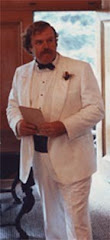There's an important early clue about this production, first performed in 2006 and now back again in Portland. You find it in the program. There is no mention whatever of Jean-Paul Sartre or of his best known play. Nothing. Programs usually have something to say about the performance at hand and its author. Not here. Why? Could it be that the performance at hand has little to do with either?
As it turned out, I liked this production much more than I thought I would. I didn't expect to like the "tilting stage" I'd read so much about. I liked it less than I expected. And I very much disliked the dynamic light design, up and down, white and red, as if lighting itself were the subject of the performance. Both, I thought, considerably distracted from one of my favorite play scripts.
But I was won over by three brilliant performances: Tim True, Joann Johnson and Maureen Porter bring focus, intelligence and energy to the lead roles with such craft that not even keeping their balance on a tilting stage distracts them. Incredible performances!
How I would like to see these performances in the play Sartre wrote, not the one creatively and physically interpreted here. In Sartre's play, they wouldn't need technology to tease the focus away from their brilliant work. In Sartre's play, stark, clean, as written, this might have been a theater moment to remember forever.
Imago usually does original work, and brilliantly so. It does original work here -- it's just misnamed. This production needs a little truth in advertising. It's not Sartre. It's variations on themes developed by Sartre. It's interesting. It's engaging. It just isn't what the playwright intended and, as a playwright, I think this needs to be said.
Get rid of the intrusive technology, and there's a wonderful production of Sartre's play waiting in the wings.
Sunday, October 18, 2009
Subscribe to:
Post Comments (Atom)










2 comments:
In Reply: I have not seen this production, in fact I have yet to set foot into a playhouse, in Portland (CA transplant). Respectfully, I wonder: is your review a cheeky rub? Is it true that the various visual sensations presented by by the stage, its physical orientation and lighting, which you imply trumped your experience of the dialogue and content interfered with passively soaking in the performance? Is the view you express not at odds with the concept of "hyperdrama"? I would suggest that one should experience this production in toto, cf. a dialogue performance.
I'd suggest seeing it again leaving intellectualizing for after the complete experience.
My point is, this is not Sartre. So why call it a play by Sartre? I am making an argument for truth in advertising, not about theater.
Post a Comment